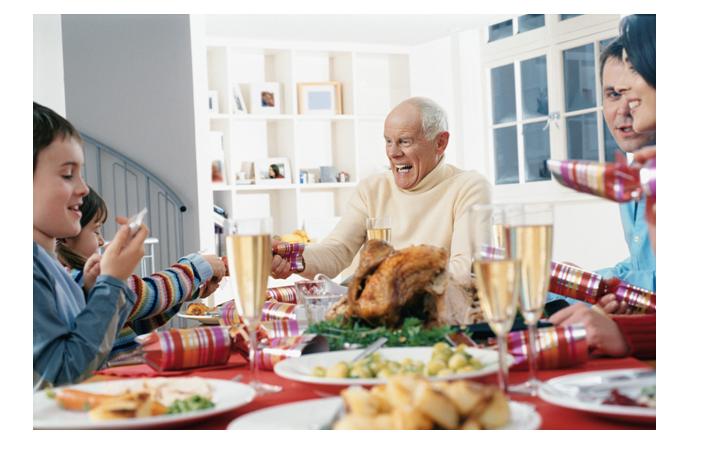 Despite the dropping temperatures, the holiday season is a very warm and joyous time of year without question. Time is spent with loved ones, festive food is served, and there are gifts galore! But while this is the time of year known for giving, the truth is that it is also notorious for being the most wasteful time of the year. In the United States, during the weeks between Thanksgiving and New Year’s Day, waste within the home increases by over 25 percent. Where does all this waste come from? Just think about all the things that go into creating that perfect holiday; the gift-wrap and packaging, holiday cards, overly-abundant food, and decorations. It’s a staggering fact, but according to the Recycler’s Handbook, half of the paper used in America annually is used to wrap packages.
Despite the dropping temperatures, the holiday season is a very warm and joyous time of year without question. Time is spent with loved ones, festive food is served, and there are gifts galore! But while this is the time of year known for giving, the truth is that it is also notorious for being the most wasteful time of the year. In the United States, during the weeks between Thanksgiving and New Year’s Day, waste within the home increases by over 25 percent. Where does all this waste come from? Just think about all the things that go into creating that perfect holiday; the gift-wrap and packaging, holiday cards, overly-abundant food, and decorations. It’s a staggering fact, but according to the Recycler’s Handbook, half of the paper used in America annually is used to wrap packages.So how can this problem be resolved without having a dismal-as-fruitcake holiday? You can “green” your holiday season in three easy steps.
First, think waste reduction. By making small changes to some of those holiday habits, you can make a big difference in the eco-friendliness of your holiday. Here are some ideas:
- When decking the halls, choose sturdy decorations that can be used year after year, rather than those designed for one-time use.
- Instead of wrapping packages in store-bought holiday paper, using old maps, posters, or comics can give your gift an edge. Or opt for gift bags, which can be repurposed and passed on over and over again. Remember that wrapping paper can be recycled and ribbons and bows can be reused!
- Instead of a card, give a friend an old photo memory with a note on the back. It’s more personal and your friend will be much more likely to keep it instead of discarding it into the trash with the other snowmen and Santa’s. Plus, doing this doesn’t waste the energy or paper needed to make a brand new card.
- One staple of today’s American holidays is the food. To minimize waste, send all of your guests home with plenty of leftovers. Also, avoid using disposable dishes and cutlery.
- Thinking about giving a gift card? Many companies now offer the option of e-gift cards. They save the card plastic and still allow your friend to shop to their heart’s content.
- If one of your family traditions is to get a Christmas tree, buy a real tree. Real trees are more sustainable than plastic ones, and can be recycled into mulch.
Second, think local. Buying local is a big word in sustainability. Not only does buying local help to protect the environment by reducing transport carbon emissions, but local businesses likely maintain more sustainable practices than the massive international factories which mass-produce consumer products as cost-effectively as possible. Local food and wine will not only make your holiday party bright, but can also make a special gift. Instead of choosing a gift from the mall that was made overseas, explore locally made goods and crafts. A gift certificate from a locally owned restaurant, salon, or spa also makes a perfect treat to give.
Aside from being a better choice for the environment, buying local does visible good for the community. The holidays are meant to be a time of giving thanks towards one another and caring about the people around us. As truth would have it, buying local is one of the best ways to do that. Supporting local business helps to keeps money within the community, supports local jobs, and gives individual business owners a fighting chance at success in the current economy.
The final step in your path towards a sustainable holiday is energy conservation. Whether you are leaving home to take a holiday trip or taking some time away from the University to be at home with family, there are some things you can do to reduce energy consumption while you are gone. Before you go, make sure you have done these things first:
- Unplug all “phantom electronics” such as printers, copiers, coffee makers, toasters, and computers. If your electronics are plugged into a power strip, flip the switch off.
- Turn off the lights, or set up a light timer for security.
- Close and lock all windows tightly so that heat does not escape. Closing blinds and curtains can add additional insulation and prevent the warm air from literally going out the window.
- Turn down the thermostat, or call the Customer Service Center (273-4567) to see if Facilities can do it for you at the University.
For more tips and tricks for your eco-friendly holidays, check out: www.ecologycenter.org/factsheets/holiday_tips.html. Also take a peek at Clay’s Green Corner for ways to think outside of the box when it comes to gift-giving.




….just another suggestion…..think of all the items that we receive that come in pretty (or fun)boxes (like soaps, writing paper, candy, etc.) or tins (cookies, popcorn, candy, etc). I’ve been saving all I receive or ones other people don’t want. Then, when Christmas or birthdays come, I use them istead of wrapping or buying a gift box and just put a real ribbon on it with a tag. The person receiving it then has a nice box or tin to keep or reuse themselves for “wrapping” a gift and they can also reuse the ribbon for whatever.
I think regifting is a great idea.
One tip I learned from my mom is to take old Holiday cards and save them. The following year I cut them up and us them as tags for my gifts. You can personalize the gift tag to match the wrapping paper or to the recipiant of the gift.
These are great tips. Personally, I think ‘re-gifting’ is OK – there is much discussion regarding etiquette behind the trend to ‘re-gift’, that is, to pass on a gift you received but do certainly not want. What’s to discuss? Re-gifting makes best sense. If we receive something we don’t need, look for methods we can reuse this gift by passing it on to someone who can use it. Naturally, re-gifting needs to be done with care so as certainly not to offend the original giver, but keeping a gift you don’t need is wasteful.